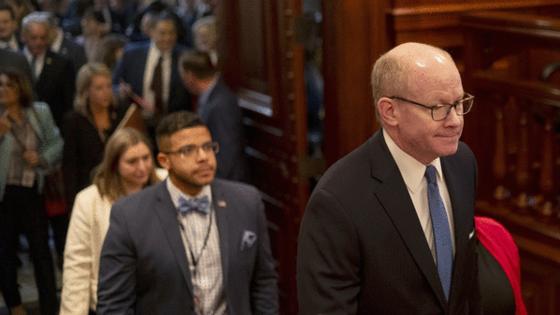Illinois Senate President Don Harmon appeals $4 million dispute with state elections board
Published in News & Features
Illinois Senate President Don Harmon filed notice Wednesday that he plans to appeal the State Board of Elections’ assertion he took millions of dollars more in campaign contributions than allowed under a law designed to reduce the impact of big money in Illinois politics.
The filing by Harmon, a Democrat who championed the law at the heart of the dispute, comes just days after he made clear in a Tribune interview that he disagrees with the state board’s interpretation that he accepted nearly $4.1 million above the contribution limits.
Although Harmon didn’t have to detail his reasons for appealing, his political committee’s attorney, Michael Kasper, checked the box on a state board of elections form stating it “does not believe” the contributions the board cited violated the limits and said the campaign fund “will be appealing” the board’s allegations. Kasper is a well-known Illinois election attorney who was once the top election lawyer for former House Speaker Michael Madigan’s political and state government operations before the longtime Democratic leader’s corruption conviction this year.
The filing begins a formal process of challenging the board’s position, a move that could lead to hearings and testimony in the coming months.
“I’m more confident now than I was when I got the notice that we have fully complied with the law,” Harmon said when asked about the matter again on Monday.
At the heart of the disagreement is a significant and controversial loophole in state campaign finance law that allows politicians to collect contributions above state limits.
A politician in a race for public office is allowed to open that loophole and collect unlimited funds if any candidate in the race in which they are running — themselves or an opponent — reports reaching a “self-funding threshold” in which they have given or loaned their campaign funds more than $250,000 for statewide races and more than $100,000 for state lawmaker and local races.
Supporters of the loophole initially said it was a defensive mechanism that allowed candidates to fundraise without limits if they were facing off against wealthy opponents who would have near-unlimited personal resources at their disposal. But it soon became an offensive weapon in which candidates — even those facing no competition whatsoever — purposely broke the self-funding threshold in order to collect as much political cash as possible.
Harmon, who helped write the law, has done that himself.
The Senate president has repeatedly given or loaned his campaign fund more than $100,000 — sometimes by just a single dollar — in order to trigger the loophole, a move political insiders call “the money bomb.” The effort has been roundly criticized by advocates who want tighter restrictions on state campaign fundraising and was a focus of the Tribune’s multipart “Culture of Corruption” series.
Specifically in the Harmon case, the disagreement between him and the state board hinges on whether the money bomb loophole was in effect between the March 2024 primary and the end of 2024, when the Friends of Don Harmon for State Senate campaign committee collected more than $8.3 million, nearly $4.1 million of which the state board said was over the campaign contribution limits.
State records show Harmon gave his state Senate campaign committee more than $100,000 in January 2023, triggering the money bomb exemption that automatically lifts the caps. Harmon indicated in state election board paperwork that the move allowed him to keep collecting unlimited cash through the November 2024 election, and he continued to do so, taking in contributions as high as $1.2 million from the Chicago Land Operators Joint Labor and Management PAC. He did that even though the board had previously told him the loophole closed after the March 2024 primary.
The board, which recently reviewed the matter following a Tribune inquiry, determined each of the public action committees that gave to Harmon following last year’s primary should have been limited to contributions of no more than $68,500. Another group, the Sports Betting Alliance which is supporting an expansion of internet gambling in Illinois, gave $250,000 to Harmon’s committee but should have been limited to donating no more than $13,700, according to the board.
Harmon has signaled that legislation to make changes in state election laws could be forthcoming, including during this spring legislative session, but has not said whether any legislation would address the money bomb loophole.
In appealing the board’s claims, Harmon’s campaign fund acknowledged that, if it loses the case, it could be subject to a penalty of up to $6.1 million — a figure based on the 150% of the amount the board deems a candidate willingly accepted over the limits — as well as a payment of nearly $4.1 million to the state’s general operating fund.
Such a massive penalty, however, is unlikely. Politicians frequently challenge the board, and negotiations can result in a fraction of the potential penalty. And if Harmon wins the appeal before the state board of elections, he could end up paying no penalty.
_____
©2025 Chicago Tribune. Visit chicagotribune.com. Distributed by Tribune Content Agency, LLC.







Comments